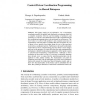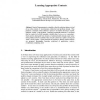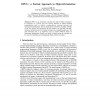973 search results - page 42 / 195 » Arguing Using Opponent Models |
111
Voted
PACT
1997
Springer
15 years 6 months ago
1997
Springer
This paper argues for an alternative way of designing coordination models for parallel and distributed environments based on a complete symmetry between and decoupling of producers...
111
click to vote
TASLP
2008
15 years 2 months ago
2008
The new model reduces the impact of local spectral and temporal variability by estimating a finite set of spectral and temporal warping factors which are applied to speech at the f...
133
click to vote
CCS
2009
ACM
15 years 9 months ago
2009
ACM
In mobile networks, authentication is a required primitive of the majority of security protocols. However, an adversary can track the location of mobile nodes by monitoring pseudo...
CONTEXT
2001
Springer
15 years 6 months ago
2001
Springer
Genetic Programming is extended so that the solutions being evolved do so in the context of local domains within the total problem domain. This produces a situation where different...
109
click to vote
FM
1994
Springer
15 years 6 months ago
1994
Springer
OPUS is an elementary calculus that models object-orientation. It expresses in a direct way the crucial features of object-oriented programming such as objects, encapsulation, mess...



